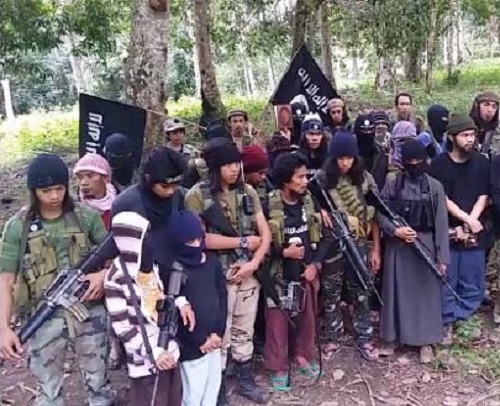The murder of a Canadian citizen abroad and the uncertainty of another still being held hostage by Islamist militants in the Philippines is putting to test the resolve of Canada’s new prime minister and his cabinet.
Prime Minister Justine Trudeau on Tuesday, expressed outrage over the beheading of a Canadian citizen held hostage by terrorists in the Philippines. But at the same time, Trudeau reiterated the government’s policy of not paying ransom to terrorists.
“Our hearts go out to the Ridsdel family and also to Mr. Holland and his family, obviously they are very concerned for his safety,” Trudeau said during a press conference after a meeting with his cabinet ministers at a luxury resort in Kananaskis, Alta. “But I want to be crystal clear about this, Canada does not and will not pay ransom to terrorists — directly or indirectly…”
Trudeau was holed up with his 30 ministers in the resort since Sunday to discuss the economic downturn in Alberta caused by plunging oil prices. A special group has been created to monitor the hostage situation in the Philippines.
‘Heinous act:’ Trudeau condemns killing of Canadian John Ridsdel https://t.co/I7EqPkI6HX pic.twitter.com/y0qQgobzOh
— CBC News (@CBCNews) April 26, 2016
John Ridsdel, a 68-year-old former mining executive, was captured with another Canadian man and two other people by Abu Sayyaf Group (ASG) Islamist terrorists in the southern Philippine island of Mindanao back in Sep. 21, last year. The group, which claims links with the fundamentalist terror group Islamic State earlier demanded as much as US$21 million each for the release of Ridsdel, fellow Canadian Robert Hall, Hall’s Filipina girlfriend Marites Flor and Norwegian Kjartan Sekkinstad.
On Monday morning, the rebel group warned the hostages will be beheaded unless $8.1 million was paid for their release. Around 7:30 pm, during a brief power blackout in the island of Jolo, a man riding a motorcycle threw a plastic bag along the road where some kids were playing. When the lights came back on, bystanders discovered the bag contained a severed head.
Philippine action
The Philippine military issued a statement Tuesday saying it has increased its operations against ASG.
“We extend our deepest sympathy and condolences to the Canadian government and to the family of Mr. John Ridsdel who died in the hands of the ASG bandits,” the Philippine National Police and Armed Forces of the Philippines said in a joint statement. “There will be no let-up in the resolute efforts of the joint PNP-AFP task group in pursuing intensive and wide-ranging military and law enforcement operations to neutralize these lawless elements and thwart further threats to peace and security.”
Trudeau said ransom payments were “obviously a significant source” of funds which terrorists use to finance their activities.
Trudeau says he’s committed 2 bringing Ridsdel’s captors to justice, helping Int’l partners. Won’t say how.#cdnpoli pic.twitter.com/oP83s6uwiM
— Vassy Kapelos (@VassyKapelos) April 26, 2016
“More importantly, paying ransom for Canadian (hostages) will endanger the lives of every single one of the Canadians who live, work and travel around the world every single day of the year,” according to the prime minister. “…We are working with our allies, including the Philippines to make sure these terrorists are brought to justice.”
Canada, the United States, and Great Britain are among the western allied countries that have a policy against paying ransom to terrorist groups.
However, earlier in the morning, former Ontario Premier Bob Rae confirmed that he had been working with the Ridsdel family to secure the release of the slain hostage. Rae, a former interim Liberal party leader, was a friend of Ridsdel.
In an interview with CTV, Rae said the government was “very directly involved” in assisting the Ridsdel family deal with the kidnappers.
“A ransom was paid for (the Italian captive), but it was nowhere near the amounts of money that continued to be bandied about (for Ridsdel),” Rae said. “It’s been an extremely frustrating and very, very difficult situation for the families to navigate.”
In an interview with Philippine media before Ridsdel’s death, Canadian Ambassador to the Philippines Neil Reader said Canadian authorities have been working closely with the Philippine government for six months now and supporting the families of the victims.
What is the Abu Sayyaf?
The Abu Sayyaf is a militant that operate in Jolo, a volcanic island in the southwest Philippines located between Philippine’s second largest and southernmost major island of Mindanao, and Borneo. The group previously forged ties with the Al-Qaeda but quickly built announced it was now allied with IS when the later group became powerful.
The ASG is one of the smallest and most violent radical groups that emerged from the Muslim separatist insurgency in Mindanao which is believed to have caused the deaths of more than 100,000 people since 1971. However, it is widely believed that the group is motivated by profit rather than ideology and is mainly a kidnap-for-ransom gang.
The hostages of the group tend to be released after ransom has been paid. However, the group is known to kill its captives if their demands are not met.
Recently, ASG has declared allegiance with IS. There are fears that the Abu Sayyaf also supports the activities of other groups with IS links such as the Indonesian militant Mujahidin Indonesia Timur and Jemaah Islamiyah (JI). There are reports that some JI members involved in a string of bombings in Bali, sought refuge with Abu Sayyaf after escaping from Indonesia.
The Abu Sayyaf is blamed for some the Philippines deadliest terror attacks, including the 2004 bombing of a ferry boat in Manila Bay which killed 100 people. The group is responsible for the kidnapping of dozens of foreigners in the southern Philippines including the abduction of 18 Indonesian and Malaysian sailors. It is believed the ASG is still holding a Dutch bird watcher who was abducted in 2012.


